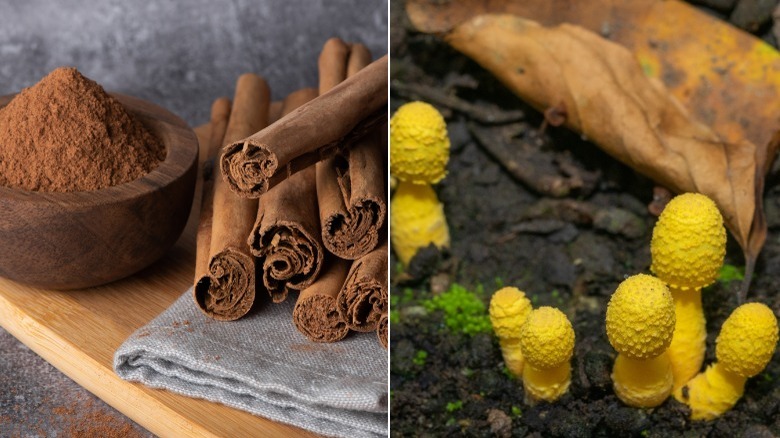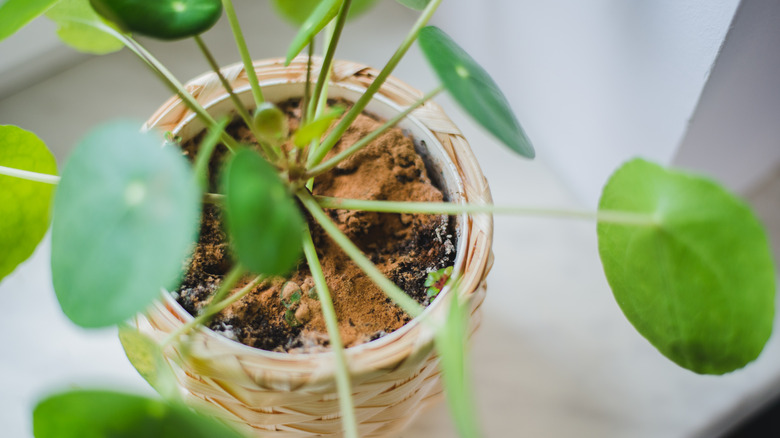The Common Kitchen Spice That Will Help Keep Fungus Out Of Your Garden
Are you trying to deal with fungal problems outside in the garden? Don't head to the store for pricey and potentially toxic chemicals just yet. Let's take a look in the kitchen for an effective solution first. A common spice loved by apple pie and Mexican hot chocolate makers alike contains enough antifungal properties to rid your plants of quite a few pesky issues. Of course, we're talking about the jar of cinnamon that you likely have sitting on your spice rack already.
According to a 2021 study published in the scientific journal Molecules, the compounds contained in cinnamon are best employed to prevent fungal growth in the first place, but the spice can also be applied to an already problematic area. The powder or whole cinnamon sticks in your cabinet will be effective, but if you want a truly powerful dose, consider tracking down some cinnamon essential oil or cinnamon bark extract. The compounds contained in these are so potent, cinnamon oil beat out 48 other oils that were tested for their antifungal activity.
How to use cinnamon as a natural antifungal
There are different types of cinnamon, and Ceylon from the Cinnamomum verum tree is considered the true species as well as the one with the highest degree of antifungal benefits. That said, whatever you have in your kitchen right now will be enough to get you started in your garden-wide antifungal campaign. By killing the fungus growing on top of the soil, cinnamon will help prevent rust, Botrytis blight, and strawberry gray mold, among other fungi-caused diseases. It's effective, safe for everyone working in the dirt, and easy to apply. Just sprinkle it over soil and around plant roots and leave it to work its magic.
During a particularly heavy rainy season, you may find small yellow mushrooms, another type of fungi, cropping up throughout the garden. (These will also grow in over watered indoor house plants.) Called Leucocoprinus birnbaumii, these mushrooms are not harmful to the plants, but they're unsightly and can be potentially harmful if ingested by kids or pets. A sprinkle of cinnamon will help discourage mushroom growth, but you may want to go further and mix a larger quantity in with your mulch before applying it.
Other ways to use cinnamon in the garden
As you begin to apply cinnamon in the garden you might notice that it's useful in other ways. For one, it can be used to repel bugs naturally. Ants can literally be stopped in their tracks if you apply a line of the spice across an area you don't want them to enter. Mosquitoes dislike cinnamon as well, though they're such a difficult pest to keep at bay that you'll likely need to add oils, such as citronella, lavender, and lemongrass, to create a homemade mosquito repellent that gets the job done. Animals from mice to squirrels similarly dislike the pungent aroma of cinnamon and are likely to steer clear of it.
Cinnamon can also be swapped for rooting hormone, notes Morning Chores, which will save you a few bucks in the budget department. Anecdotal evidence has shown cinnamon to be effective at encouraging new root growth while simultaneously discouraging yet another fungal issue called damping off disease. Just as it will cut down on fungus, cinnamon will reduce the number of those tiny insanely annoying fungus gnats in your home if you apply it to your houseplants. Sprinkle it on top of the soil the same way you would outside in the garden.


